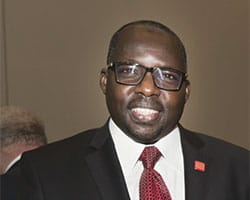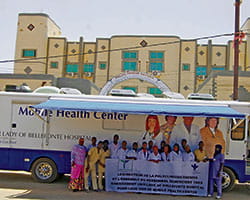
Born and raised in Niger, Africa, Dr. Mahaman Moussa is well acquainted with the challenges his country faces, especially lack of access to healthcare. Niger is one of the poorest countries in the world—ranked 187 out of 188 in the United Nations Human Development Index in 2015—and had fewer than 300 doctors working there from 2000 to 2010, according to the World Health Organization. With a population of more than 19 million, this means many people go without care every day.
Moussa immigrated to the United States in 1998, leaving his career as a veterinarian behind, and earned his bachelor’s, master’s, and doctoral degrees in nursing from 2005 to 2011. Now a family nurse practitioner and a Walden School of Nursing faculty member since 2012, Moussa has dedicated himself to helping the people back in his native country, earning him Walden’s 2017 Commitment to Social Change Award.
He funded and built the Raouda Medical Center of Tahoua and now oversees and treats patients via telemedicine and during regular visits to Niger. The 50-bed hospital opened in 2015 and provides low- and no-cost care for patients of all ages. In addition to his work in Niger and with Walden, Moussa also volunteers at a clinic for underserved patients where he lives in Winston-Salem, North Carolina.
What inspired you to open the Raouda Medical Center?

People in Niger were dying from preventable diseases such as diabetes and high blood pressure. I could not sit idly by. Our facility provides evidence-based treatments—something other medical centers in the area don’t. Our healthcare team is using Eighth Joint National Committee (JNC 8) guidelines for diagnosis and management of high blood pressure as well as American Diabetes Association guidelines for diagnosis and management of diabetes. We also have access to the latest technology—including digital mammography and X-ray and a state-of-the-art lab—for patients of all ages from all income levels.
What services do you provide?
We also provide free medications to those who cannot afford them for the treatment of hepatitis, HIV, malaria, and diabetes, and we send medical teams and our mobile health unit to help people in remote villages. On my most recent trip, we treated more than 1,200 people at our free clinics and offered free screenings and medications for hepatitis, HIV, malaria, high blood pressure, diabetes, and more.
How does teaching at Walden allow you to further your passion for social change?
I believe in the power of education to close economic gaps and open doors to opportunity. Walden lets me bring those opportunities to the citizens of the world. Walden’s focus on critical thinking and analysis gives my students the knowledge and confidence they need to find success and lift themselves up. The support of the Walden administration and faculty to allow me to do my clinical work in Niger and North Carolina and bring healthcare to those who need it most while still teaching is invaluable.
Why is your social change work so important, and how can people get involved?
I’m not a person who likes to judge others and the lives they lead. Instead, I prefer to invest my energy in making a difference, which is why I started the hospital. But you don’t have to be in the healthcare field to make things better. There are opportunities for interprofessional collaboration. I work with lawyers, accountants, and others who donate their time and expertise to make the work I do at the hospital possible.



